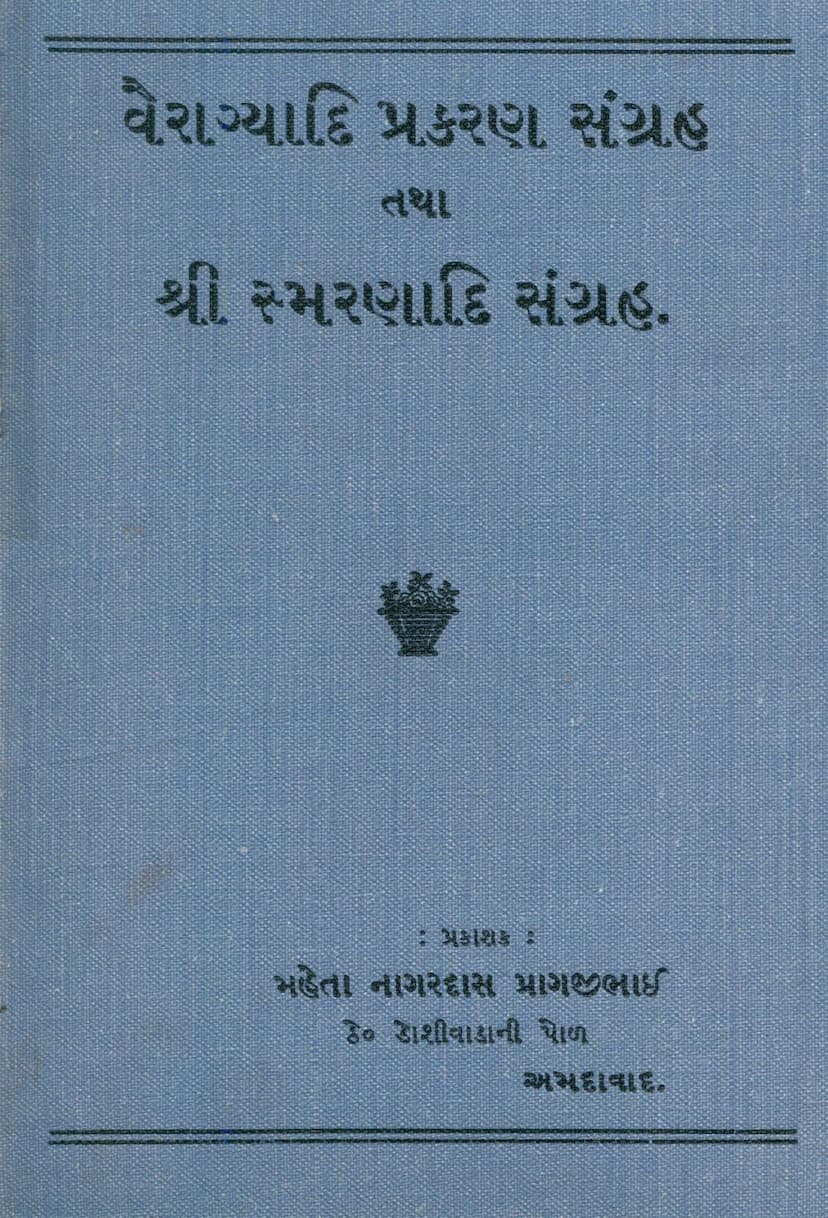Vairagyadi Prakaran Sangraha Tatha Smaranadi Sangraha
Added to library: September 2, 2025

Summary
The Jain text "Vairagyadi Prakaran Sangraha Tatha Smaranadi Sangraha" by Nagardas Pragjibhai Mehta, published by Nagardas Pragjibhai Mehta, is a compilation of Jain devotional and philosophical verses. Based on the provided pages, here's a comprehensive summary in English:
Overall Theme:
The text is fundamentally about dispassion (Vairagya) and remembrance (Smarana), two core tenets of Jainism aimed at spiritual liberation. It emphasizes the impermanence of worldly existence, the suffering inherent in the cycle of birth and death (Samsara), and the ultimate superiority of spiritual pursuits over material possessions and pleasures.
Key Sections and Concepts:
-
Vairagyadi Prakaran (Sections on Dispassion and Related Virtues):
- Impermanence of Worldly Life: The text repeatedly highlights the transient nature of life, relationships, wealth, and physical beauty. Verses describe how loved ones depart, how the body decays, and how even the most cherished possessions are temporary.
- Suffering in Samsara: It paints a vivid picture of the suffering encountered in the cycle of existence across different life forms and realms (hells, animals, humans, heavens). The constant cycle of birth, disease, old age, and death is emphasized as a source of profound distress.
- The futility of Worldly Attachments: The text strongly advises against attachment to family, friends, wealth, and sensual pleasures, comparing them to fleeting things like dew drops on a lotus leaf or dreams.
- The Importance of Dharma (Righteousness/Spiritual Path): Dharma, as taught by the Jinas (Tirthankaras), is presented as the only true and lasting refuge. It is the path to liberation from suffering.
- The Urgency of Spiritual Practice: There's a strong call to action, urging readers to engage in spiritual practices like devotion, austerity, and adherence to vows now, without delay, as life is uncertain and death is always imminent.
- The Nature of Time: The ceaseless movement of time, symbolized by the sun and moon, is depicted as consuming life and relentlessly driving the cycle of Samsara.
- The True Nature of Self: The text subtly points towards the soul (Atman) as distinct from the body and worldly possessions, highlighting its eternal and pure nature, which is obscured by karmas.
- The Eight Karmas: The binding nature of the eight karmas is mentioned as the reason for the soul's entrapment in Samsara.
- The Eighteen Flaws (Doshas): The text lists eighteen flaws that perfect beings (Tirthankaras, Siddhas) are free from, emphasizing their divine and unblemished nature. These include ignorance, anger, pride, greed, deceit, sensual attachment, aversion, sleep, sorrow, false speech, theft, envy, etc.
- The Superiority of Jain Dharma: The text promotes the Jain path as the ultimate means to salvation, superior to all other paths or doctrines. The importance of adhering to the teachings of the Jinas is stressed.
- The Virtues of a Muni (Ascetic): Descriptions of the ideal qualities of a Jain monk are provided, including detachment, non-violence, truthfulness, control of senses, adherence to vows, and virtuous conduct.
- The Dangers of Bad Company and False Teachers (Kugurus): The text strongly warns against associating with those who deviate from Jain principles, as they can lead one astray from the path of liberation.
- The Significance of Samyak Darshan (Right Faith): The importance of correct perception and understanding of Jain philosophy is highlighted as the foundation for spiritual progress.
- The Value of Equanimity (Sama-bhava): Maintaining equanimity amidst pleasure and pain, honor and dishonor, friend and foe is presented as a key spiritual practice.
- The Power of Forgiveness (Kshama): Kshama is lauded as the root of happiness, the foundation of Dharma, and a force that eradicates all evils.
- The Importance of Effort and Vigilance (Jaya and Pramada Rahita): Constant effort in spiritual practice and avoiding negligence (pramada) are crucial for progress.
- The Insignificance of Superficial Rituals: The text emphasizes that mere outward appearances or rituals without inner sincerity and understanding are futile.
-
Smaranadi Sangraha (Sections on Remembrance and Related Practices):
- The Navkar Mantra: This fundamental Jain mantra is presented as a source of protection and spiritual power.
- Upsargahara Parshva Stotra: A hymn to Lord Parshvanatha, believed to remove obstacles and bring peace.
- Shanti Stotra: Verses dedicated to invoking peace and well-being.
- Dhyana (Meditation) and Contemplation: The practice of meditating on the soul and the pure nature of the liberated beings is encouraged.
- Devotion to the Tirthankaras and Jina Dharma: The text is filled with reverence for the Tirthankaras and the Jain teachings, urging devotion and adherence to their path.
Literary Style and Structure:
- The text primarily consists of verses (Gathas) written in Prakrit, with Gujarati translations and explanations provided for each verse.
- The verses are often in metrical forms like Aryavritta and Anushtubh, giving them a poetic and rhythmic quality.
- The language used is devotional and philosophical, aiming to evoke feelings of dispassion, urgency, and spiritual aspiration in the reader.
- The compilation likely draws from various Jain scriptures and traditional teachings.
Author and Publisher:
The book is compiled and published by Nagardas Pragjibhai Mehta from Ahmedabad. The catalog link indicates it's part of a larger collection of Jain literature.
In essence, "Vairagyadi Prakaran Sangraha Tatha Smaranadi Sangraha" serves as a spiritual guide, reminding Jains of the impermanent nature of the world, the suffering in the cycle of rebirth, and the vital importance of cultivating dispassion, self-control, and remembrance of the Tirthankaras' teachings to attain liberation.